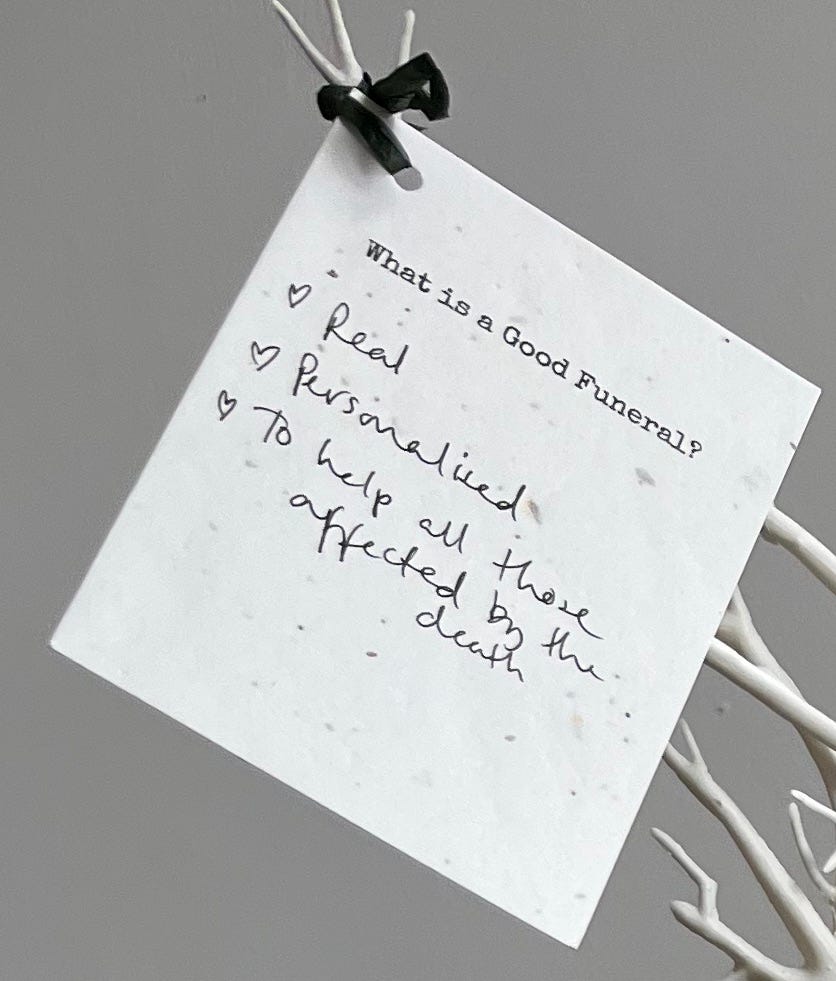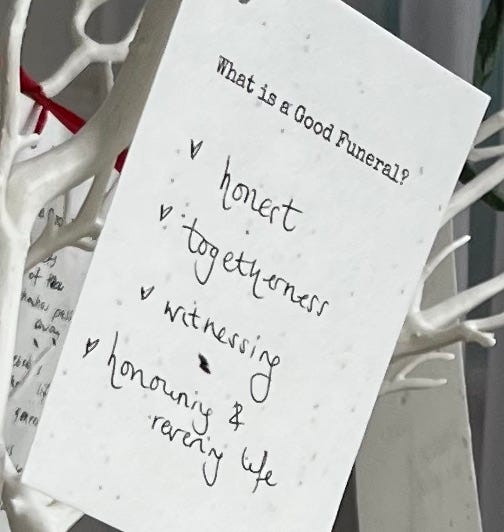What's the deal with direct cremations?
Unlike traditional cremation services, direct cremation is the immediate and unattended cremation without any accompanying ceremony. Will this do the job of helping to process someone’s death?
Image shows one of our Coffin Clubbers answer to what a good funeral means to them.
The answer to the question above isn’t as straight forward as we once thought. As funeral enthusiasts, celebrants and Coffin Club Brighton founders we used to think that direct cremations would cheat mourners out of saying a proper farewell to their deceased person.
And, even if you have a celebration of life at a different time than the direct cremation, shouldn’t the person that died be at their own funeral?
Well, just like life, death isn’t that simple… So, let’s have a look at what direct cremations really are, what the disadvantages are and even what the benefits are.
What is a direct cremation?
Direct cremation is a type of cremation service that is becoming increasingly popular in the UK and other countries. This is especially the case since Covid 19. During the worst of the lockdowns and restrictions people could not have attended funerals.
They often couldn’t attend through illness or isolation. It also wasn’t possible or advisable to store that volume of people in mortuaries. Therefore it became commonplace and necessary to find expedient ways to dispose of people’ bodies after death. Funerals basically stopped happening for a while.
Direct cremation had long been a little-known option often for people with few next of kin or with very low budgets. Covid 19 brought it into the mainstream, and like many other lockdown discoveries, it became a permanent fixture in our culture.
Direct cremation is a type of cremation service that does not involve any funeral or memorial service. Instead, the deceased is taken directly from the place of death to the cremation facility and cremated immediately. This means that there is no viewing, visitation, or any type of formal farewell. The cremated remains are typically returned to the family in an urn, and the family can then decide what to do with the remains, such as scattering them or burying them in a cemetery.
Pure direct cremations
Some commercial companies offer pure direct cremations, where they will pick up the body from the place of death (or mortuary, where a body might be held), take the body into their possession in an undisclosed location and then perform the cremation at a time and place of their choosing. You usually do not have a say in when and where it takes place, but they might give you the date and time.
Unattended cremation
Most funeral directors are also able to offer an unattended cremation service, where the body is taken into their care and taken for a cremation without any ceremony and it cannot be attended. The funeral director will usually take the body directly to the crematorium “through the back-door” (if there is one!) in the morning, before any attended funeral services take place at the chapel of the crematorium. This can also be a cost-effective or simple way of having a person cremated, although it will involve some chargeable professional services.
Benefits of direct cremation and no-fuss funerals
One of the main benefits of having a direct cremation is that it is often less expensive than traditional funeral services. Traditional funeral ceremonies can be expensive, with costs including the coffin, funeral home services, transportation, and burial fees. Direct cremation eliminates many of these costs, making it a more affordable option for families who want to keep expenses to a minimum.
Direct cremation also allows families to plan a memorial or celebration of life service at a later time, when it is more convenient for everyone. This can be especially helpful for families who have members who live far away or who cannot travel to attend a funeral service.
By holding a ceremony at a later time, people can come together to tell their stories, eat, drink, cry and hug together. Because it is not ‘time specific’ they can spend time processing their grief and preparing to remember and honour the person without the time constraints and expense of a traditional funeral service.
“Just put me in a black sack and put me out with the rubbish!”
We regularly hear from families and friends of people that have died that the person didn’t want a “fuss”. After spending some time talking and exploring this, it often becomes clear that the person didn’t want to be a bother or a big cost for the people left to arrange the funeral.
But, is it an inconvenience to have a proper farewell and gathering to grieve as a community?
It is worth first considering both personal priorities and investment before going ahead. Paying for a funeral is not “a waste of money”. It serves an important purpose and function and is an investment in your emotional health long term. It is also the last gift you can give to your person.
And, there are many other ways to bring funeral costs down that don't involve not having one. You don’t have to take a funeral director’s package A, B or C. You don’t even need to use a funeral director!
There are so many ways to create a meaningful, uplifting and personal farewell for a person that is important to you. Many celebrants are able to help create a fitting ceremony and provide support before a ceremony without a funeral director involved. Some are experienced funeral arrangers too and can help or advise you on how to plan a farewell event without a funeral director.
So, if you want to go all out for that person, do so. They can’t exactly argue with you!
Issues with no-fuss funerals
There are many issues with direct cremation. An important concern is that of emotional wellbeing. One of the main drawbacks of direct cremation is that it does not allow for a formal farewell or viewing. Some people may find it difficult to say goodbye to their person without a formal ceremony or viewing, and this can make the grieving process more difficult.
Some families or friends may choose to have a private viewing before the cremation, which can provide a sense of closure and allow for a formal farewell. This is where a great celebrant can provide an important service.
Celebrants do not just arrive on the scene on the day and talk. Most of our work is done in the preparing stage. It is much more about emotional support than most people realise.
Another drawback of direct cremation is that it may not provide a sense of finality as a traditional funeral service. Many people will tell us that it ‘just doesn’t feel finished’, or that they ‘just can’t believe it’.
For some people, attending a funeral ceremony or memorial service can be an important part of the grieving process, allowing them to say goodbye and receive support from family and friends. those who need it.
Ceremonies for direct cremations and no-fuss funerals
Another great answer from one of our Coffin Clubbers, who would choose to have a ceremony as part of the funeral.
Direct cremation is a simple and cost-effective option for people who need to keep expenses to a minimum. In some cases this might be enough for people, but it is also possible to incorporate some level of ritual and ceremonial process after a direct creation.
At Coffin Club Brighton - and as celebrants ourselves - we strongly believe in the importance of this.
Planning a ceremony is very healing. It encourages us to look at photos, exchange stories and provides an imperative for people to sit with their grief in company or in privacy. It gives a vehicle for grief, something towards which to direct energy and anxiety. It functions to enable process.
The number one advantage of a direct or unattended cremation is that it allows families to plan a funeral ceremony at a later time, when it is more convenient for everyone.
Ultimately, the decision to choose direct cremation or a traditional funeral service will depend on personal preferences, cultural traditions, and budgetary constraints.
Making decisions after someone has died
When someone has died and you are left with the arrangements, you are likely emotionally exhausted. This means it is incredibly difficult to make decisions, let alone ask questions.
Before signing a funeral director’s agreement immediately after someone died, we encourage you to ask yourself this first:
“What do I need to enable me to heal effectively? How can I remain emotionally healthy? How can this support me in the grieving process?”
We are passionate about encouraging people to find their own meaningful way of addressing their experience of grief, whatever that means. And the way a funeral is planned and conducted can play a huge part in this process. This is why we want everyone to empower themselves and their family and friends to take control of what happens when they die.
At Coffin Club Brighton, we welcome all and help anyone figure out what options they have for themselves (it’s not morbid, it’s just very organised!) and others at the end of their life. Then we help them plan ahead. We do this through conversations, community courses and clarity. We provide lots of smiles, cake and coffee too!
If you would like to know more about how we help people plan for a fitting and personal funeral that doesn’t cost the earth, check us out or sign up for our next course here.
This post is adapted by Gitte from an original blog post on Jess’ website (we are your Coffin Club Brighton founders).




